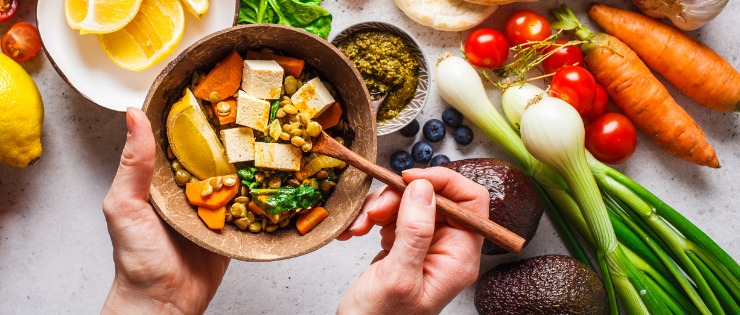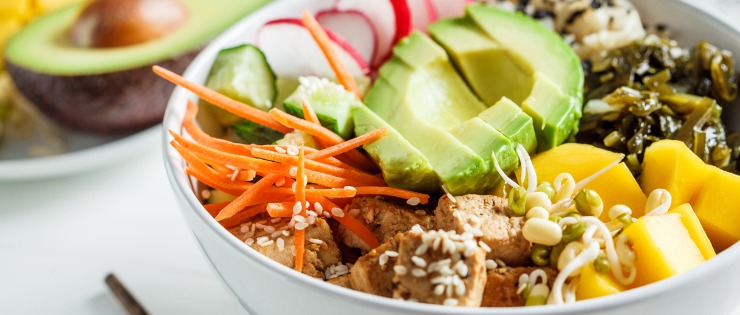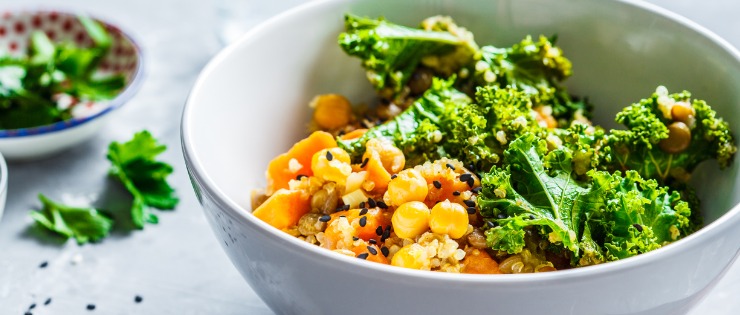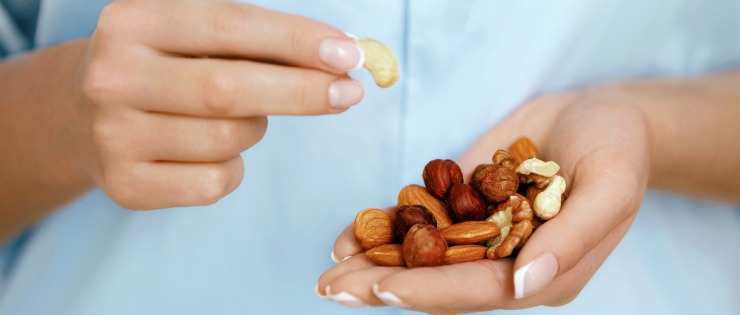
All humans need protein for good health. However, our bodies can’t store protein, so we need to include it in our diet every day for growth and repair. Many people are reducing or cutting out meat from their diet for health, ethical and environmental reasons. What some people don’t realise is their diet may lack protein and important minerals and vitamins. Find out what the research says about eating plant proteins as an alternative to meat and whether it is a healthy option.
Meat and Plant-Based Proteins
We divide proteins into their sources – meat and plant-based.
Sources of meat protein include meat, poultry, fish, eggs and dairy.
Sources of plant protein include beans, legumes, lentils and nuts.
Complete & Incomplete Proteins
You might think any type of protein will do as long as you’re eating protein, right? Not quite. Proteins are also divided into complete and incomplete. Animal protein is a complete protein while plant sources are incomplete proteins.
Benefits of Animal Protein
Animal proteins provide a range of health benefits; some of which are available in plant proteins, while others are only available in animal proteins.
Amino Acids
Animal protein is complete because they contain all the amino acids your body needs. Plant proteins lack one or more amino acids.
Vitamins and Minerals
Our bodies rely on a mix of vitamins and minerals to keep our bodies functioning and healthy. Animal proteins contain many of these important vitamins and minerals, although plant sources are also available.
Vitamin B12 – keeps nerve and blood cells health, prevents a type of anemia
Vitamin B6 - helps make haemoglobin, a protein in red blood cells
Vitamin D – needed for a strong immune system and bone health
Zinc – helps produce testosterone, and the antioxidant selenium
Iron – helps make haemoglobin, a protein in red blood cells
DHA – vital for brain development and function
Benefits of a Plant-Based Protein Diet
There are many health benefits to be gained from eating a diet high in plant-based protein, from reducing the risk of chronic disease to relieving symptoms of some health conditions. The most recognised health benefits of diets high in plant-based proteins are listed below.
Less Risk of Heart Disease
Researchers have found a diet high in red and processed meats can increase the incidence of heart disease. A study found that eating two servings of red meat, processed meat or poultry per week caused a 3-7% higher risk of cardiovascular disease and a 3% increased risk of death from all causes.

The US survey of 30,000 respondents were questioned about their diet in the last month and the past year. The survey’s author said fish, seafood, nuts and legumes, including beans and peas, were good alternatives to red and processed meats but were being under consumed by the general population.
Reduced Blood Pressure
A review of several studies examined the effect of blood pressure in people who eat a vegetarian diet compared to an omnivorous (plant and meat) diet. The review found those eating the vegetarian diet had a lower blood pressure on average compared to those who eat an omnivorous diet. High blood pressure and hypertension can lead to heart disease, stroke, and type 2 diabetes.
Reduced Risk of Cancer
Processed meat contains additives and chemicals that have been linked to cancer (particularly colon cancer). A diet with high quantities of red meat has been linked to prostate, breast and colon cancers. Cooking meat at high temperature has also been found to increase cancer risks.
The American Institute for Cancer Research promotes a diet high in plant-based foods because they contain phytochemicals which the immune system uses to fight off cancer. The high fibre content of plant-based foods can also help lower your risk of cancer. Try to choose a relatively unprocessed and wide variety of plant foods – whole grains, non-starchy vegetables and fruits – to help reduce your risk of cancer. These foods should make up at least two-thirds of your meal. Limit your intake of meat, poultry, fish and dairy to only one third of the meal.
Strengthened Immune System
Research shows that red meat and processed meats are metabolised into toxins that can cause damage to blood vessels and organs. The toxic process is thought to cause heart disease and diabetes.
A plant-based diet contains vitamins and minerals, phytochemicals and antioxidants that help keep cells healthy and your immune system strong. Antioxidants neutralise toxins in our body caused by processed food, pollution, bacteria and viruses. They also work to reduce free radicals and inflammation.
Reduced Risk of Diabetes
People who eat a plant-based diet often have a lower body weight which reduces the risk of several chronic health conditions, including type 2 diabetes. A study found that people who ate a most plant-based diet cut their risk of type 2 diabetes by 23%. For people who ate a healthy plant-based diet and cut out processed foods, added sugars and starchy vegetables, reduced their risk of type 2 diabetes by 30%.

Vegan diets have been shown to reduce the blood sugar levels in people with diabetes. In one study, 43% of participants eating a vegan diet could reduce their dosage of blood-sugar lowering medication compared to a group that followed a diet recommended by the American Diabetes Association (ADA). Substituting plant-protein for meat has also been shown to reduce the risk of poor kidney function in diabetics.
Healthy Gut
Plant-based foods have been linked to good gut bacteria because of the fibre they contain and they’re easier to digest. A healthy gut absorbs more nutrients from food and supports your immune system. One study of a group who switched to a vegan diet for 16 weeks had an improved gut microbiome.

A diverse plate of food that has different macronutrients, such as protein, fibre, complex carbs and healthy fat, increases the diversity of the microbiome. While plant-based is a healthy way to go, it’s advised to do your research and meet with your doctor or dietician to avoid missing out on certain nutrients.
Reduced Arthritic Pain
Two studies found people with rheumatoid arthritis benefited from eating a probiotic-rich, raw food vegan diet. Participants in the vegan group reported a greater improvement in their rheumatoid arthritis symptoms, including pain, joint swelling and morning stiffness than those who ate an omnivorous diet.
Weight Loss
For people wanting to lose weight, plant-based proteins are generally lower in calories and fat than animal-based protein. Keeping to a healthy BMI reduces inflammation and hormonal imbalance and reduces your risk of several cancers. Research shows that people who eat a mainly plant-based diet have a lower body mass index (BMI) than those people who eat meat.
Plant-Based Proteins
While most plant foods have a smaller amount of protein, the foods in this list have some of the highest quantities.
Almond Butter (21g per 100g)
Amaranth (9g per cup)
Black Beans (15g per cup)
Buckwheat (5g per 100g)
Chia Seeds (5g per 2 tablespoons)
Chickpeas (14.5g per cup)
Green Peas (5g per 100g serving)
Hemp Seeds (11g per 2-3 tablespoons)
Kale (2g per cup)
Kidney Beans (8g per cup)
Lentils (18g per cup)
Oatmeal (14g per cup)
Pumpkin Seeds (12g per cup)
Quinoa (8g per cup)
Spirulina (57g per 100g)

Best of all, these foods are easy to add into your daily food intake. Eat an oatmeal-based breakfast with some almond butter, when you’re making a salad for lunch add quinoa and your favourite seeds, and for dinner enjoy lentils or beans as part of your soup or stew.
All Foods & Cooking Methods Count
It’s not enough to choose a plant-based diet if you don’t make the right food choices and prepare the food properly. If you’re supplementing plant-based foods with ones that are high in sugar and fat, you aren’t doing your health any favours. Once you deep fry any food, it loses much of its nutrition and adds more calories than you probably need.
Also, watch the number of processed foods you’re eating. Snacking on savoury biscuits with your hummus dip isn’t as healthy as you might think. Swap the biscuits for vegetable sticks, then you’re reducing your salt and fat intake.
If you’re hungry between meals, try not to reach for the sweet biscuits. Choose fresh fruit, nuts or vegetables instead.

While pasta might be a plant-based food, if you’re eating it regularly you should choose a 100% whole wheat pasta or a pasta made from legumes such as lentils. Instead of white rice, choose brown rice and wholemeal bread over white bread for more nutrients and vitamins.
Weighing Up the Benefits
There can be major health benefits in reducing or cutting your intake of meat protein and increasing the portion of plant-based protein with most meals. People living with diabetes, arthritis, heart disease and high blood pressure may have the most to gain from a vegetarian or vegan diet.
But cutting out meat or all animal protein from your diet doesn’t automatically make you healthy. If you’re replacing animal protein with processed or unhealthy foods, you could harm your health. And if you’re relying on plant-based foods for all your protein and you have done little research into which foods provide the nutrients you need, your diet could be deficient.
People who eat a vegetarian diet need to make sure they are eating the vitamins and minerals needed for good health. Nutrients such as zinc, iron, calcium, protein, vitamin B12 and vitamin D can be harder to get from a vegetarian diet. Those who eat a vegan diet have a slightly bigger challenge in eating a balanced diet because they’re further restricted by not eating any animal protein.
Pregnant and breastfeeding women who eat a vegan or vegetarian diet need to give their food intake special attention to ensure they gain all the nutrients they require for a healthy mum and bub. Children also have higher nutrient needs than adults, so care should be taken with their vegetarian or vegan diet.
For help with eating a balanced diet, see a dietician for advice on a healthy meal plan that’s tailored to your requirements.